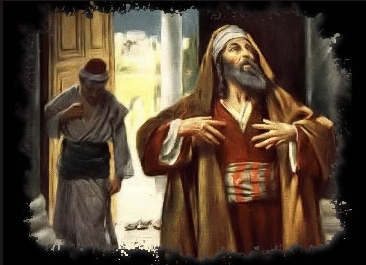Reflection for the 4th Sunday of Lent Year C
(Joshua 5:9, 10-12; 2Cor 5:17-21; Lk 15:1-3, 11-32)
Today's reflection is drawn from the beautiful and inspiring story of the Prodigal son. This story reveals God's infinite mercy and our wretchedness in the state of sin. Here, repentance and mercy embraced!
The journey begins
At what point did the Prodigal son begin to trace his steps back home? It was not his hunger that pull the string. In his hunger he looked for alternative ways to satisfy himself. But the realization of his Father's mercy summoned him to a deeper reflection, and the subsequent steps back home followed. Every genuine repentance is prompted by God's mercy.
The young man saw within the confines of his Father's generosity an end to the misery he brought upon himself. Thus realizing his Father's mercy and generosity deepened his awareness of his wasted and miserable life. This is the moment of truth. All the lies he used to fence himself crumbled. Now, all is set for the journey back home to begin.
The Confession
"I will say to him, 'Father, I have sinned against heaven and against you. I am not worthy to be called your son, treat me as one of your paid servants."' For repentance not remain as mere psychic imagination, or a sensational good wish, there is need for confession. By its very nature confession needs a witness and acceptance. In this way, repentance is no more a mere private affair. Confession of sins is a concrete expression of contrition and a source of assured forgiveness. It is a crucial step along the journey back home.
The Father's Embrace

While the Prodigal son was still a long way off, the father ran to meet him, embraced and kissed him. This implies that even before the boy began his journey home, the father's mercy awaited him. That means the father had already embraced him in his heart before running down to meet him. At this meeting point of mercy and contrition, the father first 'confessed' his love for his son through the concrete gesture of hug and kiss, even before the boy confessed his sins and contrition.
After his confession, the voice of the Prodigal son was heard no more! The Father's voice re-sounded over and over again as if the boy disappeared in his Father's embrace! The man continued to speak words of acceptance, celebration and beauty. Further, the father became a 'voice' for the Prodigal son and defended him against the elder brother's accusation.
The Celebration
The love and mercy of God is at the beginning and end of our journey of repentance back the life of grace. There is joy in heaven over one sinner who repents (Lk 15:7). The 'fattened cow' is slaughtered; the party is on...Now, the repentant son receives more--more grace--than he had before he embarked that futile adventure. The generosity and mercy of the father exposed the Prodigal son's selfishness, and equally conquered it. There is this overwhelming sense of embrace we often feel whenever we receive worthily the Sacrament of Reconciliation.
Fr Jude Nwachukwu, C.Ss.R
Ss. Peter & Paul Catholic, Church,
Tedi, Lagos
Sunday March 31, 2019
 While the Prodigal son was still a long way off, the father ran to meet him, embraced and kissed him. This implies that even before the boy began his journey home, the father's mercy awaited him. That means the father had already embraced him in his heart before running down to meet him. At this meeting point of mercy and contrition, the father first 'confessed' his love for his son through the concrete gesture of hug and kiss, even before the boy confessed his sins and contrition.
While the Prodigal son was still a long way off, the father ran to meet him, embraced and kissed him. This implies that even before the boy began his journey home, the father's mercy awaited him. That means the father had already embraced him in his heart before running down to meet him. At this meeting point of mercy and contrition, the father first 'confessed' his love for his son through the concrete gesture of hug and kiss, even before the boy confessed his sins and contrition. 